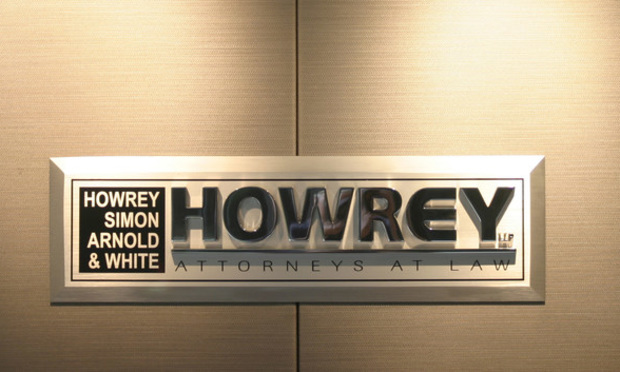Big Law Firms Urge Court to Reject 'Unfinished Business' in Howrey Bankruptcy
The D.C. appeals court is looking at the "unfinished business" doctrine at the request of the U.S. Court of Appeals for the Ninth Circuit. Howrey's bankruptcy trustee sued several law firms, saying the defunct firm is entitled to fees from matters that departed partners brought with them to their new firms.
December 17, 2018 at 04:32 PM
5 minute read
The original version of this story was published on The American Lawyer

Weighing a key issue in the bankruptcy of the now-defunct law firm Howrey, a Washington, D.C., appeals court on Monday grappled with competing views on whether dissolved law firms can claim a portion of hourly fees from matters that departed partners brought to a new firm.
A panel at the District of Columbia Court of Appeals—comprised of Chief Judge Anna Blackburne-Rigsby, Associate Judge Corinne Beckwith and Senior Judge Vanessa Ruiz—heard oral arguments pitting Howrey's bankruptcy trustee, Allan Diamond, against several large law firms that hired former Howrey partners around the time of the firm's dissolution in 2011.
Monday's arguments focused on the so-called unfinished business doctrine, the idea that a defunct law firm's bills for ongoing matters qualify as assets for the bankrupt firm that can, in turn, be used to repay creditors.
The D.C. appeals court is looking at the issue after the U.S. Court of Appeals for the Ninth Circuit certified three questions in an underlying case, in which Howrey's bankruptcy trustee sued the law firms in California federal court. The trustee is looking to recover profits from hourly cases that started at Howrey before its dissolution in 2011 but were completed after partners had moved on to new law firms. The Ninth Circuit asked for input on the case because Howrey's partnership was subject to D.C. law.
Arguing for the Howrey trustee on Monday, Christopher Sullivan of Diamond McCarthy urged the D.C. appeals court to adopt the view that a law firm's bankruptcy estate holds onto a property interest in client matters that were pending when a law firm dissolved. That interest continues “for the life of the matter,” said Sullivan, meaning that Howrey's estate deserves a cut of profits from matters that partners took with them when they left the now-defunct firm.
“The hourly engagements are the primary assets of the firm and they need to be protected,” Sullivan said. “When the firm is in dissolution and capital can't be returned to partners, then it's the liability of the creditors that has to be satisfied first.”
Jones Day's Shay Dvoretzky, arguing for his firm and other defendants, including Hogan Lovells, Kasowitz Benson Torres, and Sheppard, Mullin, Richter & Hampton, took an opposing view. He told the D.C. appellate judges that a client matter belongs to the client.
Even though modern-day law firms make investments in establishing client relationships that they hope will secure a given matter and future work down the road, legal ethics rules dictate that clients are ultimately in charge and can choose to take their work elsewhere, said Dvoretzky.
“The partner doesn't transfer the matter; the client is making the choice,” he said.
That dynamic, he added, makes a law firm's initial investment into establishing relationships one of the firm's expenses, more akin to overhead than an asset. So while a firm might account for startup costs when setting its hourly rates for a given client matter, the firm is only entitled to those hourly fees for legal work it actually provides on the matter, according to Dvoretzky.
“The core principle is that the firm has a right to be paid for the work that it did,” Dvoretzky said. He added, however, that, once “a firm has been paid for the work that it does, it has no further property interest.”
Other state appeals courts have ruled on unfinished business questions in connection with other law firm bankruptcies. In March, the California Supreme Court ruled against the bankruptcy trustee for Heller Ehrman, finding that dissolved firms are not entitled to a portion of unfinished hourly fee matters that departing partners take with them.
The California ruling was in line with a New York Court of Appeals decision that arose out of the bankruptcies of Thelen and Coudert Brothers. The New York court decided in 2014 that firms don't have ownership of client matters and that lawyers are entitled only to fees they earn from working on a specific matter.
All of the unfinished business doctrine cases have been closely watched among many in the legal community. At the D.C. appeals court, the law firms looking to fend off claims for unfinished business have received a spate of outside support in the form of amicus briefs. One of those came from the American Bar Association, which in July told the appeals court that the Howrey trustee's position was “flatly inconsistent” with legal ethics rules that emphasize client choice.
Read More:
'Unfinished Business' Claims Zapped by California Supreme Court in Heller Case
The Death of the Law Firm Bankruptcy?
Ninth Circuit Routes 'Unfinished Business' Question in Howrey Bankruptcy to DC Court of Appeals
This content has been archived. It is available through our partners, LexisNexis® and Bloomberg Law.
To view this content, please continue to their sites.
Not a Lexis Subscriber?
Subscribe Now
Not a Bloomberg Law Subscriber?
Subscribe Now
NOT FOR REPRINT
© 2025 ALM Global, LLC, All Rights Reserved. Request academic re-use from www.copyright.com. All other uses, submit a request to [email protected]. For more information visit Asset & Logo Licensing.
You Might Like
View All


TikTok Hit With California Class Action for Allegedly Mining Children's Data Without Parental Consent

Khan Defends FTC Tenure, Does Not Address Post-Inauguration Plans
Trending Stories
Who Got The Work
Michael G. Bongiorno, Andrew Scott Dulberg and Elizabeth E. Driscoll from Wilmer Cutler Pickering Hale and Dorr have stepped in to represent Symbotic Inc., an A.I.-enabled technology platform that focuses on increasing supply chain efficiency, and other defendants in a pending shareholder derivative lawsuit. The case, filed Oct. 2 in Massachusetts District Court by the Brown Law Firm on behalf of Stephen Austen, accuses certain officers and directors of misleading investors in regard to Symbotic's potential for margin growth by failing to disclose that the company was not equipped to timely deploy its systems or manage expenses through project delays. The case, assigned to U.S. District Judge Nathaniel M. Gorton, is 1:24-cv-12522, Austen v. Cohen et al.
Who Got The Work
Edmund Polubinski and Marie Killmond of Davis Polk & Wardwell have entered appearances for data platform software development company MongoDB and other defendants in a pending shareholder derivative lawsuit. The action, filed Oct. 7 in New York Southern District Court by the Brown Law Firm, accuses the company's directors and/or officers of falsely expressing confidence in the company’s restructuring of its sales incentive plan and downplaying the severity of decreases in its upfront commitments. The case is 1:24-cv-07594, Roy v. Ittycheria et al.
Who Got The Work
Amy O. Bruchs and Kurt F. Ellison of Michael Best & Friedrich have entered appearances for Epic Systems Corp. in a pending employment discrimination lawsuit. The suit was filed Sept. 7 in Wisconsin Western District Court by Levine Eisberner LLC and Siri & Glimstad on behalf of a project manager who claims that he was wrongfully terminated after applying for a religious exemption to the defendant's COVID-19 vaccine mandate. The case, assigned to U.S. Magistrate Judge Anita Marie Boor, is 3:24-cv-00630, Secker, Nathan v. Epic Systems Corporation.
Who Got The Work
David X. Sullivan, Thomas J. Finn and Gregory A. Hall from McCarter & English have entered appearances for Sunrun Installation Services in a pending civil rights lawsuit. The complaint was filed Sept. 4 in Connecticut District Court by attorney Robert M. Berke on behalf of former employee George Edward Steins, who was arrested and charged with employing an unregistered home improvement salesperson. The complaint alleges that had Sunrun informed the Connecticut Department of Consumer Protection that the plaintiff's employment had ended in 2017 and that he no longer held Sunrun's home improvement contractor license, he would not have been hit with charges, which were dismissed in May 2024. The case, assigned to U.S. District Judge Jeffrey A. Meyer, is 3:24-cv-01423, Steins v. Sunrun, Inc. et al.
Who Got The Work
Greenberg Traurig shareholder Joshua L. Raskin has entered an appearance for boohoo.com UK Ltd. in a pending patent infringement lawsuit. The suit, filed Sept. 3 in Texas Eastern District Court by Rozier Hardt McDonough on behalf of Alto Dynamics, asserts five patents related to an online shopping platform. The case, assigned to U.S. District Judge Rodney Gilstrap, is 2:24-cv-00719, Alto Dynamics, LLC v. boohoo.com UK Limited.
Featured Firms
Law Offices of Gary Martin Hays & Associates, P.C.
(470) 294-1674
Law Offices of Mark E. Salomone
(857) 444-6468
Smith & Hassler
(713) 739-1250






